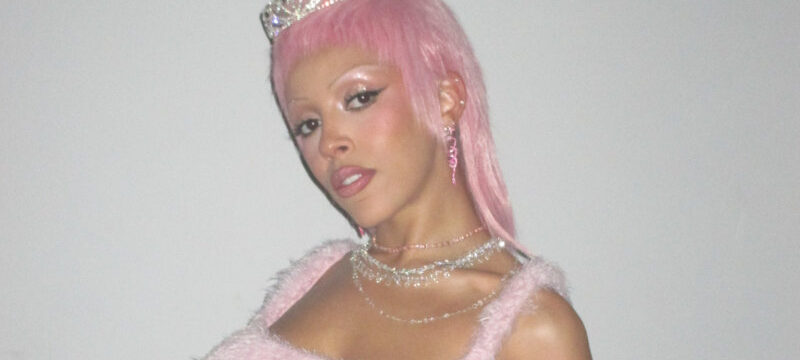Save articles for later
Add articles to your saved list and come back to them any time.
Dark, menacing, hilarious: Doja Cat’s Scarlet.
Doja Cat, Scarlet
★★★½
Currently on Doja Cat’s Instagram, the singer – real name Amala Dlamini – is spruiking mock t-shirts for her followers emblazoned with the slogan, “Recovering Doja Cat fan”. Considering the pre-release rollout that accompanied her new album Scarlet, you’d imagine they’ve sold out instantly.
There’s so much context to parse out with Scarlet, Doja’s scorched earth swivel, I don’t know where to start. In May, the musician – famed for slinky chart-toppers like Say So, Kiss Me More and Woman, that won her a Grammy and made her one of the world’s biggest pop stars – torched her breakthrough albums Hot Pink (2019) and Planet Her (2021) as “cash grabs” and mocked her own fans for falling for “mediocre pop”.
If scorning your own fans is an unlikely pop star move, in July she did it again after telling her fans, who call themselves Kittenz, to get off their phones and find a job. Shocked, one fan suggested Doja tell her Kittenz she loves them, to which Doja replied: “I don’t though cuz I don’t even know y’all.” A fair sentiment, some might say, and a refreshing antidote to pop stars who enable the sycophantic tendencies of their obsessive stans. Alas, Doja’s followers weren’t impressed.
That same month, after her fans urged her to speak out about her partner, online personality J. Cyrus, who had been accused of emotionally abusing members of his Twitch community, Doja laughed off their concerns with a “I never have and never will give a f— what you think about me or my personal life”, called her followers “miserable hoes” and bid them good riddance.
There was new music, too, but they caused similar mayhem. Scarlet’s early singles – including Demons and Australia’s current number one, Paint the Town Red – dabbled in horrorcore darkness. In the US, where a pop star invoking satanic imagery is still perennially triggering, the clips – in which Doja danced with Death, wore a sheen of dripping blood, and demonised Christina Ricci – exacerbated her alienation from the mainstream throngs and fostered online commentary that she’d actually sold her soul to the devil.
Even for a singer who built a career on her eccentric online presence, and who’s been no stranger to controversy in the past (eg: loitering on alt-right message boards in her youth, working with Swedish producer Dr Luke in the midst of his court case against Kesha, etc), Doja’s recent antagonism has been something to behold. Last month, it was reported she’d lost over 500,000 followers online; she responded by saying she felt “free” and as though she’d slayed a “large beast”.
As such, Scarlet finds the pop star in the midst of a remarkable heel-turn era. Balut, a track named for the Filipino duck embryo delicacy, even opens with a sample from wrestler Ric Flair to drive the point home. Thankfully for Doja – and to borrow a line from John Lydon – anger is her energy.
Across the album’s rap-heavy first half, particularly on the infectiously marauding Wet Vagina and hilariously trollish 97 (where she’s trying to get cancelled by PETA, for some reason), her delivery is remarkably scattershot, shifting from baby-voiced coos to sassy taunts to harried shrieks and staccato power. If you only knew Doja from, like, Coles Radio, you might be surprised.
If album rollouts won awards, Doja Cat’s Scarlet would sweep the lot.
Her impish charisma also remains. There are two pointed samples on the album – Burt Bacharach, Hal David and Dionne Warwick’s Walk On By on the opener Paint the Town Red, and 10CC’s I’m Not In Love on Shutcho – and they’re both messages aimed, rather coldly, at her own fans. It’s a special kind of pop star who uses her record label’s sample budget to take shots at her own listeners, but it’s just the sort of superstar pettiness I enjoy.
But then, halfway through, there’s Agora Hills, named for the site of Alice Coltrane’s Anantam Ashram commune where Doja spent her formative childhood years. The song, a smooth pivot echoing her more familiar R&B sound, finds Doja calling for autonomy from the expectations, or intrusions, of fame. It’s typically wild but there’s something emotional about her plea, an appeal to sidestep the public scrutiny her art’s afforded her.
It opens a string of vulnerable tracks – the escapist love song Can’t Wait, the regretful and conflicted Love Life (“I love it when my fans ain’t mad… I love it when my fans love change,” Doja offers) – that while soul-stirring, mute the bluster of the album’s furious first half.
For an album that, for so much of its hefty running time, so menacingly embraces the dark side – after Billie Eilish’s Happier Than Ever and Olivia Rodrigo’s recent Guts, it’s another post-breakout follow-up from a fledgling pop star that paints fame as a hellmouth unworthy of coveting – the sudden mood shift doesn’t belong. Her fans might appreciate the penitential nod, but that’s what the t-shirt’s for. Personally, I wish she’d trimmed the hope and just let it bleed. Everyone needs an angry album now and again.
To read more from Spectrum, visit our page here.
The Booklist is a weekly newsletter for book lovers from books editor Jason Steger. Get it delivered every Friday.
Most Viewed in Culture
From our partners
Source: Read Full Article


